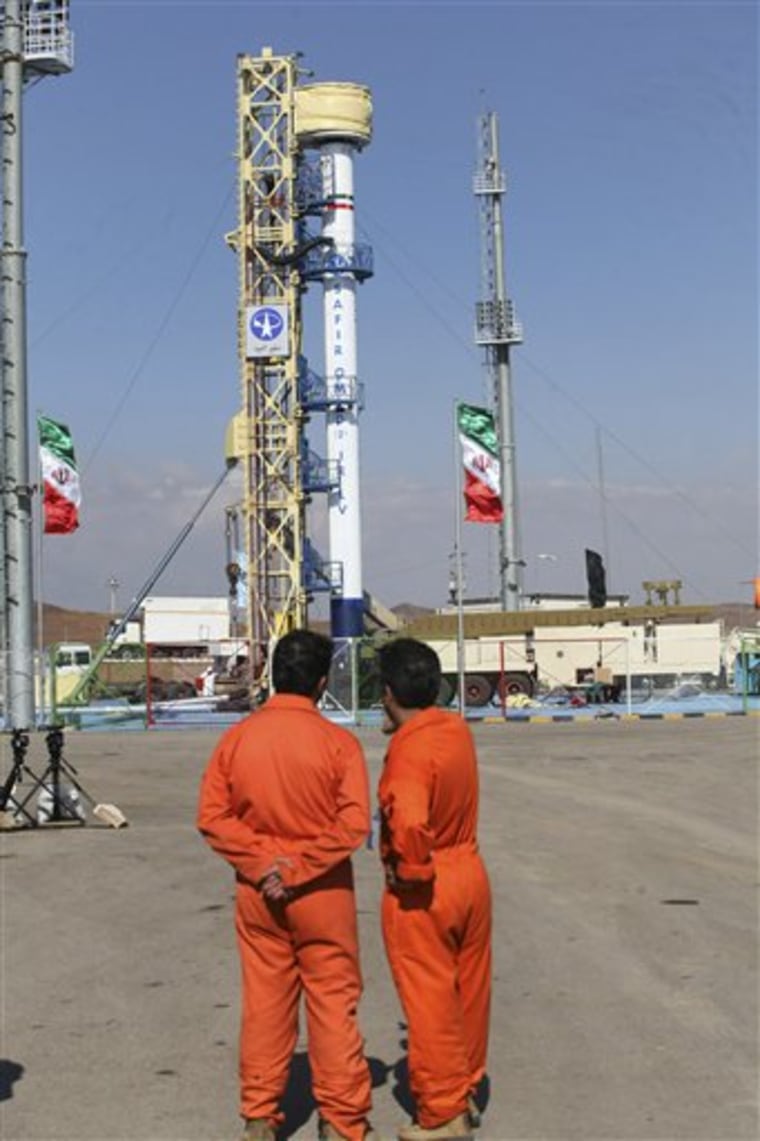The launch of Iran's first domestically made satellite is a cause for concern, Pentagon officials said Tuesday.
Reuters quoted a U.S. military official as saying Tehran's space program may use technology that also could be used for ballistic missiles.
However, another U.S. national security official earlier described the launch as a step that has important symbolism but does not alter the region's strategic balance.
Although Iran's ambitious space program has worried many international observers, the security official told Reuters the satellite wasn't considered a "game changer".
"The satellite technology they have deployed is probably not state of the art, but for the Iranians this is an important symbolic step forward," the official said, speaking on condition of anonymity.
The comments came after Iran's president announced the country has successfully sent the satellite, called Omid, or hope in Farsi, into orbit.
State television showed footage of what it said was the nighttime liftoff of the rocket carrying the satellite at an unidentified location in Iran.
"This action does not convince us that Iran is acting responsibly to advance stability or security in the region," said White House spokesman Robert Gibbs.
Intentions unclear
A U.S. counterproliferation official confirmed that Iran launched a satellite. "How they intend to use it remains to be seen, and there is a possibility that we're witnessing satellite technology in this instance that isn't too far removed from Sputnik 1957," he said on condition of anonymity to speak about intelligence gathering. "And how long the satellite can actually remain functional is a question that remains, literally and figuratively, up in the air."
In Jerusalem, the head of Israel's Space Agency, Zvi Kaplan, said initial reports show that a satellite was launched.
"We are not surprised because in this day and age of information and technology and with Iranian scientists studying abroad they can obtain the knowledge," he said.
Iran has long held the goal of developing a space program, generating unease among world leaders already concerned about its nuclear and ballistic missile programs.
Gibbs called any effort to develop missile delivery capability, continue an illicit nuclear program, or threaten Israel is an "acute concern to this administration." He also reiterated that the administration will use all elements of its national power to deal with Iran.
The United States and some of its allies suspect Iran is pursuing a covert nuclear program. Iran denies the charge, saying its atomic work is only for peaceful purposes such as power generation.
'Serious concern'
"This test underlines and illustrates our serious concerns about Iran's intentions," Britain's Middle East minister, Bill Rammell, said in a statement.
The announcement of Omid's launch comes during festivities marking the 30th anniversary of the 1979 Islamic revolution that toppled the U.S.-backed shah and brought hard-line clerics to power. State TV said the satellite was launched "for the great celebration of the Iranian nation and the 30th anniversary of the victory of the revolution."
Ahmadinejad said Tuesday that the satellite, which he said had telecommunications capabilities, had reached its orbit and had made contact with ground stations, though not all of its functions were active yet. The launch was intended to be a message of peace and friendship to the world, Ahmadinejad told state television. "We need science for friendship, brotherhood and justice," he said.
The announcement of Omid's launch also came as officials from the U.S., Russia, Britain, France, Germany and China were set to meet Wednesday near Frankfurt to talk about Iran's nuclear program.
The group has offered Iran a package of incentives if it suspends uranium enrichment and enters into talks on its nuclear program. The U.N. Security Council has imposed sanctions to pressure Iran to comply.
Iranian television said the satellite would orbit at an altitude of between about 155 and 250 miles. It was taken into orbit by a Safir-2, or ambassador-2, rocket, which was first tested in August and has a range of 155 miles.
The radio report said the satellite is designed to circle the earth 15 times during a 24-hour period and send reports to the space center in Iran. It has two frequency bands and eight antennas for transmitting data.
Ahmadinejad said Iran has achieved the ability to launch satellites into orbit and would now seek to increase the ability of its satellite-carrier rockets to carry more weight.
Despite the anxiety by the U.S. and its allies over Iran's space program, it is not exactly clear how developed it is.
Russian link
In 2005, Iran launched its first commercial satellite on a Russian rocket in a joint project with Moscow, which appears to be the main partner in transferring space technology to Iran. Also in 2005, the government said it had allocated $500 million for space projects in the next five years.
Iranian officials first started developing the satellite, which weighs 60 pounds, in 2006.
Iran has said it wants to put its own satellites into orbit to monitor natural disasters in the earthquake-prone nation and improve its telecommunications. Iranian officials also point to America's use of satellites to monitor Afghanistan and Iraq and say they need similar abilities for their security.
Iran hopes to launch three more satellites by 2010, the government has said.
More on Iran
